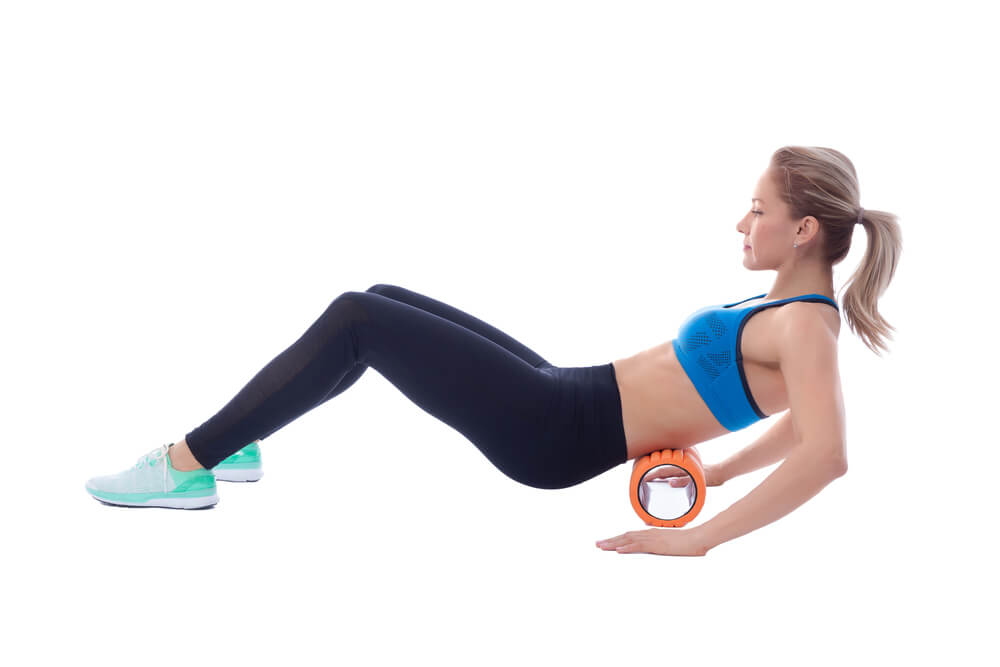
Keep your shoulders healthy at home with a few simple exercises that will improve flexibility and mobility. For those with chronic conditions, these exercises can help you with pain relief, and including them in your daily routine could see results very soon. As with any exercise routine, make sure you set your space up correctly with plenty of space to move around and a suitable surface to lie on such as a yoga mat or towel. For these exercises, a foam roller is required. If your pain increases, stop and seek help.
Exercise 1: ‘Shoulder Protraction’
Start this exercise with your foam roller firmly on the ground and lie lengthways over the roller with your face up, so it supports the full length of your spine underneath. Start with your knees bent.
- Find your balance on your foam roller
- With your hands together and your elbows straight, reach up to the ceiling to create protraction of your shoulders
- Allow your arms to reach as far as possible without feeling any pain
- Lower your arms into retraction but keep your hands together and your elbows straight. Feel the movement of the shoulder blade as you do so.
- Regulate breathing and keep your movements slow and controlled.
Exercise 2: ‘Chest Open’
Start in the same position as for the previous exercise with your hands together and your elbows straight.
- With your foam roller underneath you and your legs bent up slowly lower your arms to the side, travelling towards the floor at shoulder height.
- If your chest or shoulders are uncomfortable, start by lowering down at chest height.
- As this gets easier over time you can lower your arms so that your hands are at head height, and so on.
- Keep your knees together throughout.
- Feel the stretch being applied across your chest and the fronts of your shoulders.
Exercise 3: ‘Thoracic Extension’
Don’t worry this one looks like a sit-up exercise but it isn’t. With support underneath from your foam roller, this stretch is far easier and targets your thoracic spine. This increases upper body mobility which is closely linked to the mobility of the shoulder blades. If you’re feeling sore in your upper back or shoulders this exercise may relieve that tension and can reduce pain over the long term.
- Positioned your foam roller just above the middle of your back – crossways.
- Place your hands behind your head and gently reach back – avoid more than a comfortable stretching pain.
- Only go as far back as feels comfortable.
- Gently rise back up and repeat.
If pain is caused or persists during or after these exercises make sure you get in touch with a qualified physiotherapist for expert advice and treatment options.
Know The Facts About Shoulder Injuries
Exercising is important to stay mobile and healthy, and knowing about the risks and potential ways a shoulder can be injured can also help in understanding why certain stretches are important. Equally, knowing how and why physiotherapy is important for shoulder joint health can assist in preserving better and long-lasting bone health. For more information about how physiotherapy is effective in relieving shoulder pain click here.
Physiotherapy As A Treatment For Shoulder Pain
Shoulder rehabilitation is a delicate process and is best facilitated by a physiotherapist. With long term structural issues and chronic pain conditions being the result of poorly managed rehab programmes, it’s best to consult with the experts who know best when it comes to your physical health. When working with qualified physiotherapists, you can be sure that every detail has been carefully considered with your customised rehabilitation programme. At Integrity Physio, we take your injury seriously, and with years of experience in shoulder injuries and rehabilitation programmes, having you back in action is our priority. Maximise your chances of a strong recovery and book your appointment today.




